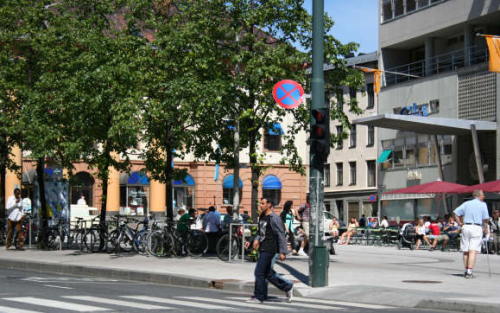What opportunities and barriers face young adults of immigrant background in Europe? Researchers from 7 countries are studying the life stituations of young immigrants in Norway, Sweden, Estonia, England, Spain, Italy and France.
This EU-financed project is now entering its final year. The project's first book, which describes the situation country by country, was published a few months ago. Book number two - a theme-based comparison - is on the way.
– Such a comparative study has not been undertaken before. Most comparative projects are based upon statistics. We, on the other hand, use people's life stories in combination with participant observation.
– It's exciting to see how legislation and statistics are reflected in the lives of individuals, says Katrine Fangen who is a senior researcher at the Department of Sociology and Human Geography at the University of Oslo.

Both similarities and differences
Researchers have found many features in common: All of the countries have media and politicians that present immigrants as a threat to democracy or as a burden to the welfare state, and thus they act more exclusive than inclusive.
On the other hand the researchers have also found great differences. What opportunities and barriers face immigrants in various countries depends on the policies in individual countries.
Immigrants in class societies face greater problems than those in more egalitarian societies. It can be easier to gain employment quickly in a country with a large secondary labour market, in contrast to how the situation is in Norway. But in our cases from Italy and Spain, the problem for the young immigrants who work in the informal economy is that they have unstable contracts and much fewer rights than the majority of the population. What appears inclusive in one respect can be exclusive in another.
Norway has not been much affected by the financial crisis and this is reflected by the high employment rate - and this includes immigrants.
Nuancing "Immigrants"
In some cases having an immigrant background is a scarce resource in the labour market, the sociologist points out.
– In one example positive prejudice is shown towards immigrants of Chinese background. Both in Norway and England this group is better represented than the population average in the labour market. A number of our informants see their immigrant background as a strength, both in the labour market and elsewhere, but we see that national background influences who experiences this.
Fangen is interested in communicating the nuances between the ethnic categories and in breaking down categories like "immigrants".
– A qualitative study is suited to showing different examples within each category. Even though there are many unemployed Norwegian Somalis there are also Norwegian Somalis that are in higher education and many have good jobs working for the state or in local government.
Making recommendations to the EU
– Are you also making recommendations?
– yes, that's what the EU requires. We are to deliver a policy brief every six months. Some policy briefs are completed and are soon to be published: The policy briefs look at citizenship laws, access to the job market, the educational system, the media's angle and political participation. Additionally, we are planning a policy brief about the neighbourhood and the experience of belonging. I don't, however, want to say anything about the actual recommendations before they are published.
– Could you nevertheless tell us something?
– Yes, indeed. We recommend a harmonising of citizen legislation across Europe. It should be easier for immigrants from non-EU countries to gain the same rights as other EU citizens.
– A restrictive citizenship legislation that results in many young people being on the outside of society and without rights is disadvantageous from both a state's and the immigrants' perspectives. The EU should use the power it has to influence countries such as Italy and Estonia where it is particularly difficult to gain citizenship.
– In Italy even descendents of immigrants must document uninterrupted residence in the country until they are 18 years old, and very few are able to do that. Estonia operates a strict language requirement. Many young people of Russian heritage attend Russian schools and live in Russian speaking neighbourhoods, and are therefore not able to pass the language test.
The obligation to think about the implications of research
– Is there is a difference between EU projects and projects funded by the Research Council of Norway (NFR)?
– Yes. The EU demand policy recommendations. Another demand is international collaboration: You need to have research partners from at least three countries. EU projects result in international dissemination. I have been to Brussels several times to present results from the project and there I meet EU politicans, bureaucrats and researchers from other projects. I will be attending a big conference in Brussels where EUMARGINS will be represented with its own stand, with posters and brochures. In this way our research gains international attention.
– Is this something NFR should gain inspiration from?
– NFR also holds this kind of dissemination conference, but in Norway. Its reach is clearly shorter.
– Is the demand for policy recommendations a good idea?
– Yes, I think it's a good idea. It obliges us to think about what implications our research can have.
